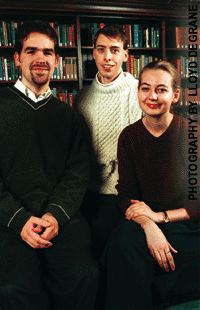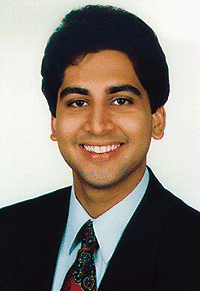College
scholars cross the pond…again
 Current
Rhodes scholar Erin A. Bohula,
AB’99, advises the University’s newly named Rhodes and Marshall
scholarship winners to cultivate a taste for mayonnaise, because
in Britain, where they’ll be studying, “it’s served with everything.”
She also suggests that they bring umbrellas and be ready “to meet
some amazing people, both students and teachers.”
Current
Rhodes scholar Erin A. Bohula,
AB’99, advises the University’s newly named Rhodes and Marshall
scholarship winners to cultivate a taste for mayonnaise, because
in Britain, where they’ll be studying, “it’s served with everything.”
She also suggests that they bring umbrellas and be ready “to meet
some amazing people, both students and teachers.”
 |
| A
Chicago triumverate heads for the United Kingdom:
Fourth-year David B. Haglund (left), Robert F. Chenault, AB'99,
and fourth-year Sarah C. Bagby all won Marshall scholarships
this year. |
Bohula
is one of four alumni who received prestigious British scholarships
last year. Maureen N. Dunne, AB’98, AM’98, and Mira C. Lutgendorf,
AB’99, also received Rhodes scholarships, while Elizabeth M. Evenson,
AB’99, was awarded a Marshall scholarship.
Two
more College students and two more recent grads will be following
in their footsteps next year: a Rhodes scholar and three Marshall
scholars, all of whom plan to study at the University of Oxford.
Chicago’s 35th Rhodes scholar, Jasdip S. (“Jesse”) Kharbanda,
AB’99, was one of 32 U.S. students to receive the honor this past
December. One week later, Robert R. Chenault, AB’99, and fourth-years
Sarah C. Bagby and David B. Haglund became three of 40 Americans
to pick up a Marshall. This is the first time three University
of Chicago students have received the scholarship in one year,
bringing Chicago’s total number of Marshall winners to 15.
Established
in 1902 by British patriot Cecil J. Rhodes, his scholarship provides
tuition and living expenses for up to three years of study at
Oxford. The Marshall scholarship program was founded by an act
of the British Parliament in 1953 and commemorates the ideals
of the Marshall Plan. Funded by the British government, the scholarship
provides tuition and a living stipend to Americans for two years
of study at any British university.
 |
| Rhodes
scholar Jesse Kharbanda, AB'99 |
While
on his Rhodes, Kharbanda will study economic theory and environmental
science. Interested in the potential effects of global warming
on small-scale farmers in the developing world, he says he would
like to pursue a career in environmental public policy as both
a researcher and an advocate.
Bagby
plans to apply her Marshall toward the study of biochemistry.
She wants to explore how malfunctions in the internal communication
of single cells can lead to diseases such as cancer and cholera,
hopefully yielding clues to the development of therapies for these
diseases. She would also like to pursue a career in teaching.
“Challenging my students stimulates me to challenge myself,” says
Bagby, who has served as a teaching assistant in biology. “And
coming up with new ways of explaining what we know helps me to
find new questions to ask about what we don’t know.”
Chenault
will study classics, looking for ways to make Greek and Latin
available to more students at a younger age. He hopes to one day
establish an educational academy that will include training in
Greek and Latin--subjects he believes provide great joy while
training young minds in interdisciplinary subjects. Chenault credits
Chicago’s classics department with kindling his love for the subject:
“When people ask me what there is for a classicist but to teach
classics, I say nothing would please me more than to interest
others in the field that has given me such pleasure.”
Haglund
plans to study English literature on his way to becoming an essayist
and a biographer of Wallace Stevens. He says he would eventually
like to write and edit for such literary publications as the New
York Review of Books. “I must thank Wayne Booth for feeding
my growing passion for literature and thoughtfulness and then
assisting that pursuit as perhaps no one else has,” he adds.
Dunne,
one of Chicago’s current Rhodes scholars, says the recent winners
may be surprised by how different it feels to pursue their intellectual
passions at Oxford, without an American emphasis on output, deadlines,
or tests. “You can escape to a garden and read for hours because
the supervisors here encourage you to read and re-read until you
think about your material differently,” she says, advising them
to prepare to live life more slowly, and perhaps more fully, next
year.
And,
if mayonnaise isn’t the new group of scholars’ condiment of choice,
Bohula recommends opting for Britain’s other culinary passion--Indian
cuisine.--Jennifer
Leovy


![]()


